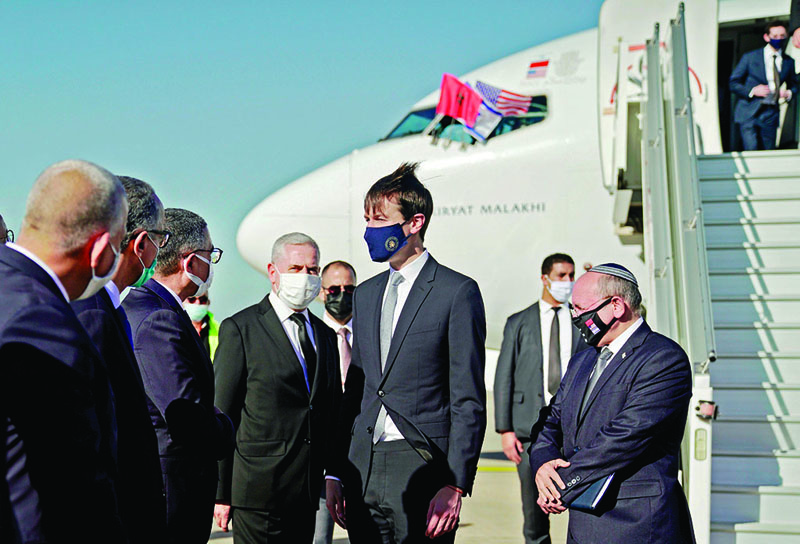
RABAT: The first Israel-Morocco direct commercial flight landed in the North African kingdom yesterday to mark the latest US-brokered diplomatic normalization deal between the Jewish state and an Arab country. US President Donald Trump's son-in-law and White House advisor Jared Kushner was on board along with Israeli Prime Minister Benjamin Netanyahu's National Security Advisor Meir Ben Shabbat.
The US-Israeli delegation was welcomed at the airport by Moroccan officials, ahead of a program that includes a meeting with King Mohammed VI at the royal palace, and a visit to the grave of Mohammed V. The trip aimed to showcase the Trump administration's achievements in Middle East diplomacy, weeks before Trump is replaced at the White House by President-elect Joe Biden.
Morocco became the third Arab state this year, after the United Arab Emirates and Bahrain, to normalize ties with Israel under US-brokered deals, while Sudan has pledged to follow suit. Speaking at Israel's Ben Gurion airport before his departure, Kushner said Israel's recent string of breakthrough deals marked a step towards a more normal co-existence between Jews and Muslims.
"The state we have lived in for the last 75 years, where Jews and Muslims have been separated, is not a natural state," he said before getting on the plane which was painted with the Hebrew, Arabic and English words for "peace". Both sides expected to sign agreements paving the way for direct air links, and on water management, connecting their financial systems and on a visa waiver arrangement for diplomats, said an Israeli official source.
Morocco has North Africa's largest Jewish community of about 3,000 people, and Israel is home to 700,000 Jews of Moroccan origin. Up to now, up to 70,000 Israeli tourists a year have visited Morocco, but they have had to travel via third countries.
As part of the Morocco-Israel deal unveiled earlier this month, Trump fulfilled a decades-old goal of Rabat by backing its contested sovereignty in the disputed region of Western Sahara. The move infuriated the Algerian-backed pro-independence Polisario Front, which controls about one fifth of the desert territory that was once a Spanish colony. Negotiations included pledges to open a US consulate in Western Sahara, and for US investment which Moroccan media described as "colossal".
Israel and Morocco are meanwhile due to reopen diplomatic offices. Morocco closed its liaison office in Tel Aviv in 2000, at the start of the second Palestinian intifada, or uprising. Mohammed VI has said Morocco will remain an advocate for the Palestinians. Alongside the announcement of the resumption of relations with Israel on Dec 10, the king assured Palestinian president Mahmoud Abbas of Morocco's "continued and sustained commitment to the just Palestinian cause".
But the Palestinians - like the Polisario - have cried foul and condemned the normalization announcement between Rabat and the Jewish state. Two pro-Palestinian demonstrations were banned last week in Rabat, and about 30 groups and far-left parties yesterday denounced the visit by the "Zionist delegation", demanding Morocco "resist normalization".
Morocco has sought to temper the anger by insisting that relations with Israel are not new. "The new agreement is merely the formalization of a de facto partnership between Morocco and Israel dating back 60 years," said Moroccan media boss Ahmed Charai. "The two states have assisted each other vitally for decades," Charai wrote, pointing to security cooperation in Israel's 1967 Six-Day War and "quiet Moroccan diplomacy" that helped foster peace between Egypt and Israel.
Morocco is home to North Africa's largest Jewish community, which dates back to ancient times and grew with the arrival of Jews expelled from Spain by Catholic kings from 1492. It reached about 250,000 in the late 1940s, 10 percent of the national population, but many Jews left after the creation of Israel in 1948. Under the rule of King Mohammed, several programs have been launched to rehabilitate old Jewish districts, cemeteries and synagogues. - AFP


